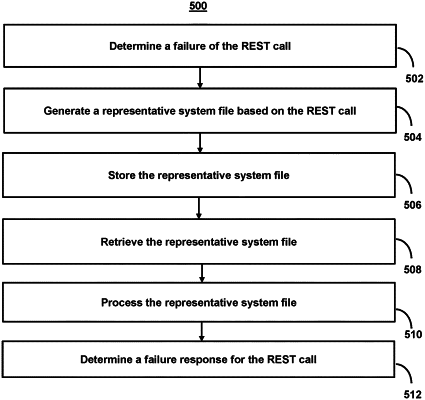| CPC G06F 11/076 (2013.01) [G06F 9/45512 (2013.01); G06F 9/542 (2013.01); G06F 9/547 (2013.01); G06F 11/0793 (2013.01)] | 18 Claims |

|
1. A system for improved processing of messages subject to dead letter queues in representational state transfer (“REST”) architecture to prevent data loss in cloud-based computing environments through dynamic file creation without a need for independent storage of the messages, the system comprising:
cloud-based dedicated memory; and
cloud-based control circuitry configured to:
receive a REST call;
compare the REST call to a system parameter;
determine a failure of the REST call based on comparing the REST call to the system parameter;
determine whether the failure corresponds to a first failure type or a second failure type based upon a system parameter type of the system parameter to which the REST call was compared, wherein the first failure type requires manual review, and wherein the second failure type does not require manual review;
determine to generate a representative system file based on the REST call in response to determining that the failure corresponds to the first failure type; and
determine not to generate the representative system file based on the REST call in response to determining that the failure corresponds to the second failure type;
generate the representative system file based on the REST call in response to determining the failure, wherein the representative system file includes a characteristic of the REST call;
store the representative system file in the dedicated memory;
retrieve the representative system file from the dedicated memory, wherein the representative system file is retrieved from the dedicated memory based on a configuration file that specifies shell commands to run periodically on a given schedule;
process the representative system file, wherein the representative system file is processed using a serverless compute service that runs code without managing servers, creating workload-aware cluster scaling logic, maintaining event integrations, or managing runtimes;
determine a failure response for the REST call based on processing the representative system file;
generate a modified REST call based on the failure response;
transmit the modified REST call;
transmit the failure response in response to determining the failure response for the REST call based on processing the representative system file; and
delete the representative system file from the dedicated memory.
|